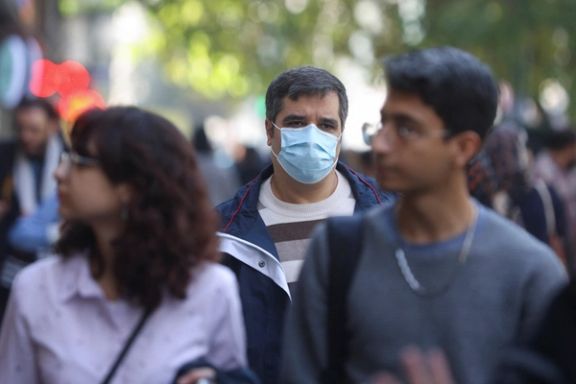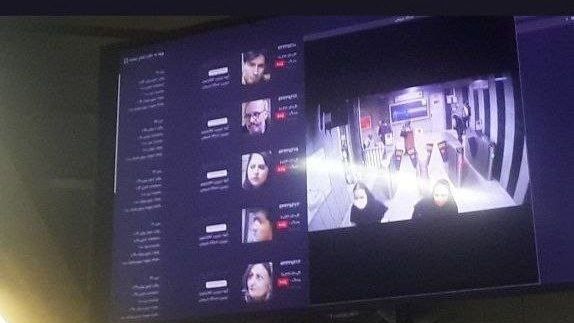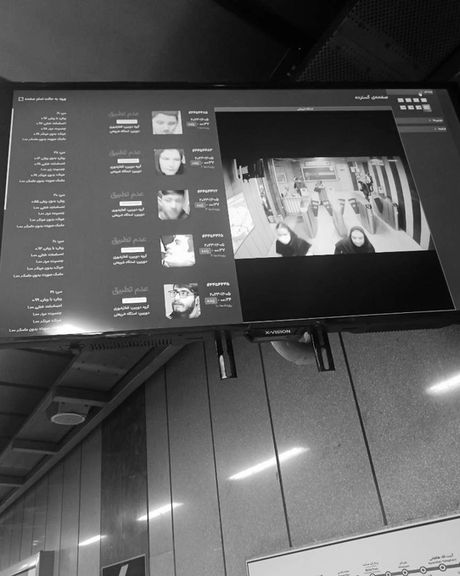Faces Of Passengers Displayed In Iranian Metro To Enforce Hijab

Authorities in Iran’s religious city of Mashhad have resorted to displaying their facial recognition capabilities as a measure to frighten women into wearing the hijab.

Authorities in Iran’s religious city of Mashhad have resorted to displaying their facial recognition capabilities as a measure to frighten women into wearing the hijab.
Vahid Tafrihi, the social editor of Khorasan newspaper in Mashhad, was the first to bring the controversial move to public attention in an Instagram post on Monday. His post included a photo of one of the monitors that displays photos of several subway passengers taken from CCTV footage along with their age and gender.
“This is the Shariati Station of Line One of Mashhad Metro. The photo of all people who pass by CCTV cameras is shown together with age and gender information on large monitors. Can the municipality explain what it is seeking to achieve by this?” Tafrihi, whose newspaper is owned by the religious shrine in the city, asked.
Astan-e Qods-e Razavi is a massive state body under Supreme Leader Ali Khamenei’s control which manages the shrine of the 8th imam of Shiites in Mashhad and its vast economic empire.
The Instagram post appears to have been removed from Tafrihi’s account, but a screenshot of the post is being widely circulated on social media. Arash Hashemi, another journalist from Mashhad, said in a tweet Tuesday evening that the monitors seem to have stopped showing passengers’ images and information for the time being.

The age and gender info displayed on monitors was apparently obtained from the identity documents linked to passengers’ travel payment cards.
Social media users say similar monitors that were first installed at Mashhad railway station around six months ago were employed at the city’s subway stations and airport a month ago.
Many social media users have interpreted the move, which they say reminds them of a society like the one described in George Orwell’s novel 1984, as the authorities’ attempt to show off the facial recognition capabilities at their disposal to intimidate women who refuse to abide by the mandatory hijab.
Mashhad, the hometown of President Ebrahim Raisi, is Iran's second-largest city with a population of over three million, and one of the bastions of Iran's hardliners.
“Disclosure of individuals’ personal information [such as age] is a crime and is punishable by law,” Keyvan Saedy, a conservative politician and former lawmaker, tweeted Tuesday.
“Mashhad subway’s disclosure of passengers’ personal information is an obvious violation of citizenship rights, causes loss of security and psychological peace, and destroys the ruling systems’ image. It indicates misunderstanding and insult to Islam even if it done for [enforcing] the religious duty of hijab,” he wrote and demanded serious action to be taken against those behind the move.

Speaking to Faraz Daily, an online news website, Tuesday evening, a Mashhad city council member claimed that the municipality was not responsible for the installation of CCTV cameras and monitors.
“We don’t know who is controlling them,” Hasan Mansourian told Faraz Daily, adding that the cameras that make it possible to display information on the person whose image is shown on the monitor must be somehow connected to a central server such as the state registration organization which issues national IDs and operate with artificial intelligence.
He also said the cameras are going to be turned off “until permits are issued” and the public is informed about the plan.
In late November, authorities similarly refused to take responsibility for the deployment of hijab enforcers at the capital Tehran’s subway stations which were quickly dubbed as “tunnels of horror” by opposition media and social media users.
Authorities claimed the black-veiled women who lined-up the subway corridors to inspect passengers’ hijab abidance, and the cameramen who filmed the passengers as they passed, were “citizens’ groups” carrying out the religious duty of enforcing hijab for which everyone is responsible.